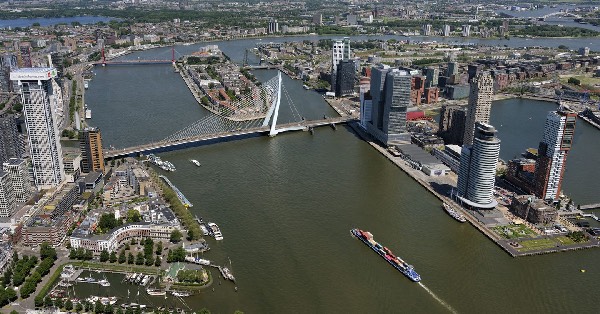The war in Ukraine has prompted the European Union and other bodies to impose a number of sanctions on Russia. The extensive import of energy (crude oil, oil products, LNG, coal) is not (yet) affected by sanctions, but the export and transhipment of containers in particular suffers from the uncertainty caused by the war and the sanctions.
Russia-oriented transhipment
Of the roughly 470 million tons transshipped through the port of Rotterdam, 62 million tons are oriented towards Russia (13%). Large amounts of energy carriers are imported from Russia via the port of Rotterdam. This comes to roughly 30% of Russian crude oil, 25% of LNG and coal, and 20% of oil products. Russia exports products such as steel, copper, aluminium and nickel via Rotterdam.
New sanctions
The measures of the European Union’s fifth sanctions package published on 8 April will take effect on Easter Sunday morning, 17 April, at 0:00. The package includes a prohibition on access to ports in the territory of the European Union for vessels registered under the flag of Russia.
This package includes a ban on:
- imports from Russia of coal and other solid fossil fuels
- access to EU ports for all Russian vessels
- entry into the EU for Russian and Belarusian road hauliers
- the import of other goods such as wood, cement, fish products and alcohol
- the export of aviation fuel and other goods to Russia
The sanctions package contains exceptions for certain types of cargo. Vessels sailing under the flag of Russia but falling within the exceptions may therefore still be allowed access to port. The exceptions relate to cargo such as oil and gas, refined petroleum products and a number of ores, pharmaceutical and medical products, agricultural and food products, and products for civil nuclear applications, as well as extending to vessels where humanitarian grounds apply.
A Russian vessel’s master, agent, owner and cargo owner must ascertain whether the vessel falls within exceptions under which it can be allowed access. However, the Harbour Master will remain responsible for implementing the port access policy. Separately from this sanctions package, the European Union published a list of natural persons and entities against which restrictive measures have been imposed in the fourth sanctions package. That list also includes a number of vessels, to which certain exceptions apply.









































